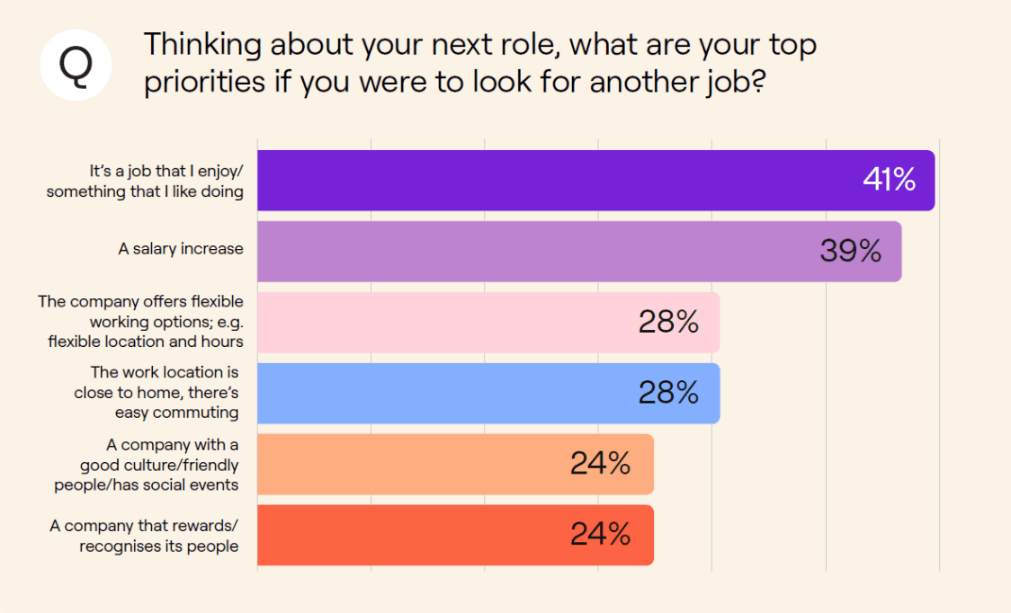Will Australia see the effects of ‘the great resignation’ by February 2022?
Intrinsic motivators are stronger drivers than a higher salary. Whether the Great Resignation happens or not, there’s one thing on job seekers’ minds and it’s themselves. The term Great Resignation was first coined in May 2021. It described a movement by employed Americans who had quit their job after reevaluating their career priorities, social interactions…
Intrinsic motivators are stronger drivers than a higher salary. Whether the Great Resignation happens or not, there’s one thing on job seekers’ minds and it’s themselves.
The term Great Resignation was first coined in May 2021. It described a movement by employed Americans who had quit their job after reevaluating their career priorities, social interactions at work and vaccine mandates. The UK displayed the same pattern of behaviour, and now experts predict it is likely to happen in Australia by February 2022.
Over the past few months, there has been much discussion around whether the Great Resignation will present itself in Australia, and if it does, what that will look like.
We’ve been listening to those in both the recruitment and our specialist industries, and the topic is polarising. Even within our team, there are differing opinions on whether it will have any effect on the Australian job market.
However, there is one common theme: employees are putting themselves first regarding why they are looking for a new job and what they are looking for. Whether it’s related to personal well-being or wanting more control over their lives, employers need to be aware of this shift in attitude.
While we can’t be certain the Great Resignation will present itself in any great form in Australia, we wanted to share cold hard facts that provide an insight into the current employment market and allow you to make your own prediction.
What have we seen historically?
It may seem strange to ask this question, considering we have just faced a pandemic. But it is worth noting that the start of the year is typically a popular time for resignations.
According to Psychologist Tina Papadakos , careers counselling enquiries surge around January after people have come back to work and had time to reflect and set new year goals.
“Intrinsic motivators” such as lack of values alignment, lack of job satisfaction and wanting to find a sense of purpose are stronger motivators for people to leave their roles than for a higher salary, according to Papadakos. This finding was replicated in a recent study by Employment Hero, where they surveyed 1,000 workers around Australia to learn about the current employment market.
 This comes as no surprise as businesses that have poor company culture typically have higher turnover rates.
This comes as no surprise as businesses that have poor company culture typically have higher turnover rates.
What are we seeing now?
Employment Hero’s Employee Movement and Retention Report found 40% of those surveyed are looking for a new role within the next six months. Poor company culture, lack of appreciation or recognition, lack of career opportunities and no pay rise are the top four motivators for why people want to leave their current roles. 41% say finding something they like doing or a job they enjoy is the number one priority in their next job.
Behavioural Scientist Aaron McEwan says employees want to be treated as humans, not just workers. So the relationship between employees and employers is not seen as being purely transactional.
He says they want to see how work can add value to their lives rather than treating it as a separate experience.
In a recent interview with TIME , LinkedIn CEO Ryan Roslansky, says that employees “are rethinking, not just how they work, but why they work and what they most want to do with their careers and lives.”
Further insights from LinkedIn demonstrate a 26% increase in the number of workers changing jobs in October 2021 compared to October 2019. Women and men are changing at the same rate.
So, will we see the Great Resignation or not?
We expect an increase in resignations in the coming months as we recover from a record low number of resignations. Once employees have had a break and reassessed their goals for the new year, they will look for a new role that aligns. Some may wait until mid-year when they can escape the Australian winter and travel to Europe freely.
While the term Great Resignation in America and Europe represented employees resigning without a new role lined up, we would typically expect Australians to leave employment for a new position.
Whether we consider it a Great Resignation or not, one thing is clear, people are putting themselves first, and this awareness of self-worth has further heightened after enduring a global pandemic, lockdowns and restrictions.
What does this mean for Australian businesses?
Employers must consider this shift in attitude and adjust their attraction and retention strategies to align. Given that circumstances have changed, former talent management and employee value propositions will not be as effective as they might have been pre-pandemic.
Think about what your business can offer to improve and add value to your employees’ lives. There is no one-size-fits-all solution, so it’s a good idea to learn what job seekers prioritise. Check out our previous blog to understand why people are resigning and what they are looking for.
Follow us on LinkedIn and Instagram to learn more as we share practical talent management advice for Australian businesses.







